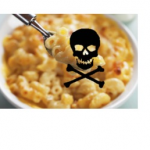“Should you pack Lunchables for Your Kid’s School Lunch?” asks a piece in the April 9th edition of Consumer Reports. The article claims that these lunch kits contain lead and other contaminants, and may harm children’s health. Do parents need to worry?
Phthalates
"Synthetic chemical in consumer products linked to early death, study finds.”
“People with the highest levels of phthalates had a greater risk of death from any cause, especially cardiovascular mortality, according to a study published today in a peer-reviewed journal.”
Let’s take a look behind the headlines, at the study itself, to see what it actually says. [1]
Just as restaurants, fast-food or otherwise, are beginning to open up, a new study demonstrates an association between eating out and your mortality. I’ve had a few bad meals in my time, but can they be killing me?
On Feb. 20, a large headline from CNN crosses my screen: ‘’Chemicals in plastics damage babies’ brains and must be banned immediately, expert group says”. A shocking, scary headline based on cherry-picked data that misleads the public. What are these chemicals that must be banned immediately?
Another chemical scare group has a brilliant message: Don't eat at restaurants. The phthalates from plastic wrap and gloves will get you. If you eat at home they still will, just not as fast mega-stupid.
"Science" took a walk on the wild side in a recent New York Times piece. It tried to tell us that the tiny amount of a class of chemicals found in macaroni and cheese (and everywhere else on Earth) is going to wreak havoc with our sex hormones. It's so bad, it's almost funny.
Now that I'm in the second trimester, I'm starting to think about baby bottles, sippy cups, and all that fun stuff. But all the options online leave me thinking I don't have much choice when it comes to BPA-free bottles. And I don't mean lack there of.
Ho hum. Endocrine disruptors again. This time it's from a study in Europe that involves two chemicals and two female reproductive disorders. The only problem is that the study tells us absolutely nothing. The authors should be embarrassed by this paper.
It's a rare event when even the fervently anti-chemical journal Environmental Health Perspectives publishes a study exonerating phthalates from contributing to childhood obesity. So how rare is it when it publishes two such studies? Must be a blue moon, again.
The latest: ACSH Advisor Dr. C.S. Prakash receives the 2015 Borlaug CAST (Council for Agricultural Science and Technology) Communicator Award, blood DNA test could detect cancer tumors, and CSPC watchdog puts agency to task for shoddy science.
Former CPSC Commissioner Nord takes the Commission to task for shoddy science, apparently rendered in service to a pre-determined decision to regulate another safe and useful chemical right off the market.
The American Council on Science and Health consulted the U.S. Consumer Product Safety Commission (CPSC) on the plasticizer chemical known as diisononylphthalate (DINP) regarding its Chronic Hazard Advisory Panel (CHAP) report and the resulting proposed "Prohibition of Children's Toys and Child Care Articles Containing Specified Phthalates"





